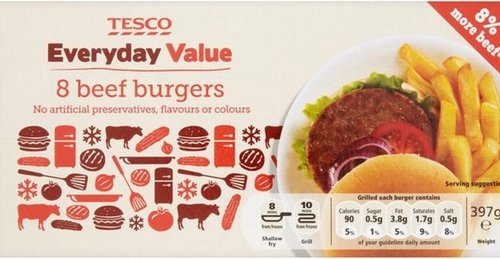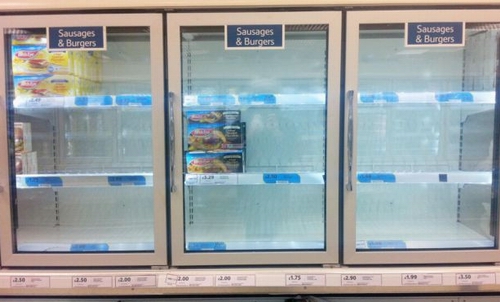As shock and revulsion spread across Britain, there were concerns that the industry’s failure to test routinely for horse meat in supermarket beef products may have masked a tainted burger controversy over several years.
The meat industry revealed that until recently there had been no tests available for equine DNA in the UK or Ireland, as we are not horse eaters.
But yesterday it was revealed contaminated products were left on the shelves for two months after the Food Standards Agency of Ireland failed to inform retailers of their findings until this week.
The FSAI admitted that it knew traces of horse meat were in burgers two months ago after carrying out the first ever routine horse DNA tests on 27 supermarket own brands.
Its table of test results acquired last November showed some of the contaminated burgers had a shelf life of at least a year – and up to 18 months. That raised yet more concerns about how long horse meat burgers have been on sale.

Tim Lang, professor of food policy at City University said yesterday: “It could have been going on for years but we wouldn’t know about it because we have never conducted tests. For too long we have had light touch regulation.”
Labour MP Barry Gardiner, a member of the Commons Environment, Food and Rural Affairs select committee, said: “People who have been eating this food for the past year have a right to feel angry and upset and the firms should be held to account. If ever there was a case for heads to roll, this is it.”
Silvercrest-supplied Burger King, the world’s second biggest fast food chain, issued a statement saying it was confident it had not been affected.
But a Silvercrest Foods spokesman told the Mirror: “No one in the meat processing industry checks for equine products.
"The suppliers and processes are EU-approved, so they have gone through a checking procedure.”
The shocking admission that there were no safeguards in place for DNA checks across its supply chain forced Asda, Sainsbury’s and the Co-op to scrap a total of 22 own-label burger ranges yesterday, as Silvercrest and sister firm Dalepak also make their beef patties.
All three chains stressed the move was “precautionary” and no products were directly affected.
Asda said: “We take matters like this extremely seriously, despite the fact we aren’t implicated in this report.”
The Co-op echoed that and Sainsbury’s said: “All our burgers are made from 100% British beef but as a precautionary measure we are withdrawing those sourced from Dalepak.”

Tesco cleared its shelves earlier this week as it emerged watchdogs knew of a problem as early as November.
More than a third of frozen burgers were found to contain horse DNA during the IFSA’s initial tests two months ago.
Budget burgers from Tesco and patties from Iceland, Aldi, Lidl and Dunnes Stores tested positive.
But the ISFA’s own procedures meant three more tests had to be carried out to verify its findings before its results were made public on Monday and shelves cleared.
It said new testing methods allowed it to check randomly for horse DNA – and admitted it was a “massive coincidence” that its first ever probe revealed 10 out of 27 products were contaminated, one with 29% horse meat.
Silvercrest and sister firm Dalepak Hambleton of Yorkshire – owned by ABP Food Group – and independent Irish based Liffey Meats are at the heart of the biggest scandal to hit the beef industry since the mad cow scare of the 1990s.
The finger of blame was being pointed at the original source of the horse meat contamination in Spain and Holland. But Silvercrest refused to say how long it had dealt with the European suppliers.
In a statement, parent firm ABP said it had sent its own investigators to the two companies for spot checks but stopped short of naming them.
“Should our own testing prove positive, we are also considering our options in respect of the two suppliers,” it said.
“We are shocked by the result of these tests and are currently at a loss to explain why one showed 29% equine DNA.”
Industry magazine The Grocer said there was speculation in the meat trade that the horse DNA found in burgers could be linked to the use of a binding agent that stops the pattie falling apart.
As shoppers reeled from the news that children’s favourite snacks were under the microscope, there were moves for a massive shake-up in the industry. Tesco, which saw £350million wiped off its market value, vowed to review how it tests its products. A spokesman said: “We have stringent tests but this development shows we might need to review these.”
Last night it took out full page newspaper ads to apologise to shoppers over the fiasco and vowed it would never happen again.
“We and our supplier have let you down,” it told customers.
But is was business as usual at Silvercrest – and ABP chief executive Paul Finnerty said the plant was churning out a million patties a day.
“Burgers are still being made,” he said. “We are comfortable we have identified the problem.”
He was adamant that the company “does not buy horse meat” but admitted: “There has been a system breakdown”.
A statement by ABP said: “As a result of this incident we are implementing a new testing regime for meat products which will include DNA analysis.”
Last night Burger King said: “None of our products are affected by this.
"As a precautionary measure to ensure our guests’ safety, we have taken swift action to investigate further and ensure no affected product entered our system.”
Liffey Meats said it had “never produced, purchased or traded any equine products”.
It said it was carrying out DNA tests and added that levels of horse DNA found in three of its products were “minute” and less than 0.1% in one case.
The UK’s Food Standards Agency said it was looking at legal action once a full investigation had been carried out.
Its job is to ensure food is safe – but has seen its budget slashed from £143million last year to £132million next year.
And funding for Trading Standards services, which make local checks, is plummeting from £213million 18 months ago to no more than £170million in 2014, Whitehall’s spending watchdog found.
Labour’s shadow food secretary Mary Creagh said last night: “The Government needs to come clean about whether the scale of its cuts to trading standards and meat inspections has made this kind of scandal more likely.”
David Cameron, speaking at Prime Minister’s Questions, called the scandal “disturbing and unacceptable”.
Rationing staple killed off after the war
Horse meat was eaten in Britain until the 1930s but has remained largely off the menu ever since – except in wartime.
During food rationing in the Second World War horse meat shops popped up all over the country along with alarming signs that read: “Horse Meat – fit for human consumption”.
Since then there have been some efforts to reintroduce it to Britain.
Enterprising butcher Bob Walker set up shop in the market place at Smethwick, West Mids, in 1996 as Britain’s only specialist horse meat butcher.
He lasted barely a year.
“There just wasn’t the demand,” he said.
Yet TV chef Gordon Ramsay still hopes to bring horse meat back into the British diet.
Five years ago he declared: “I’ve eaten horse.”
Ramsay went on to explain that the meat is nutritious and packed with protein, iron and Omega-3 fatty acids.
Every year Britain sends up to 10,000 live horses that have reached the end of their working lives to Italy, France and Belgium for human consumption, and the majority come from the New Forest, Exmoor and Dartmoor.





